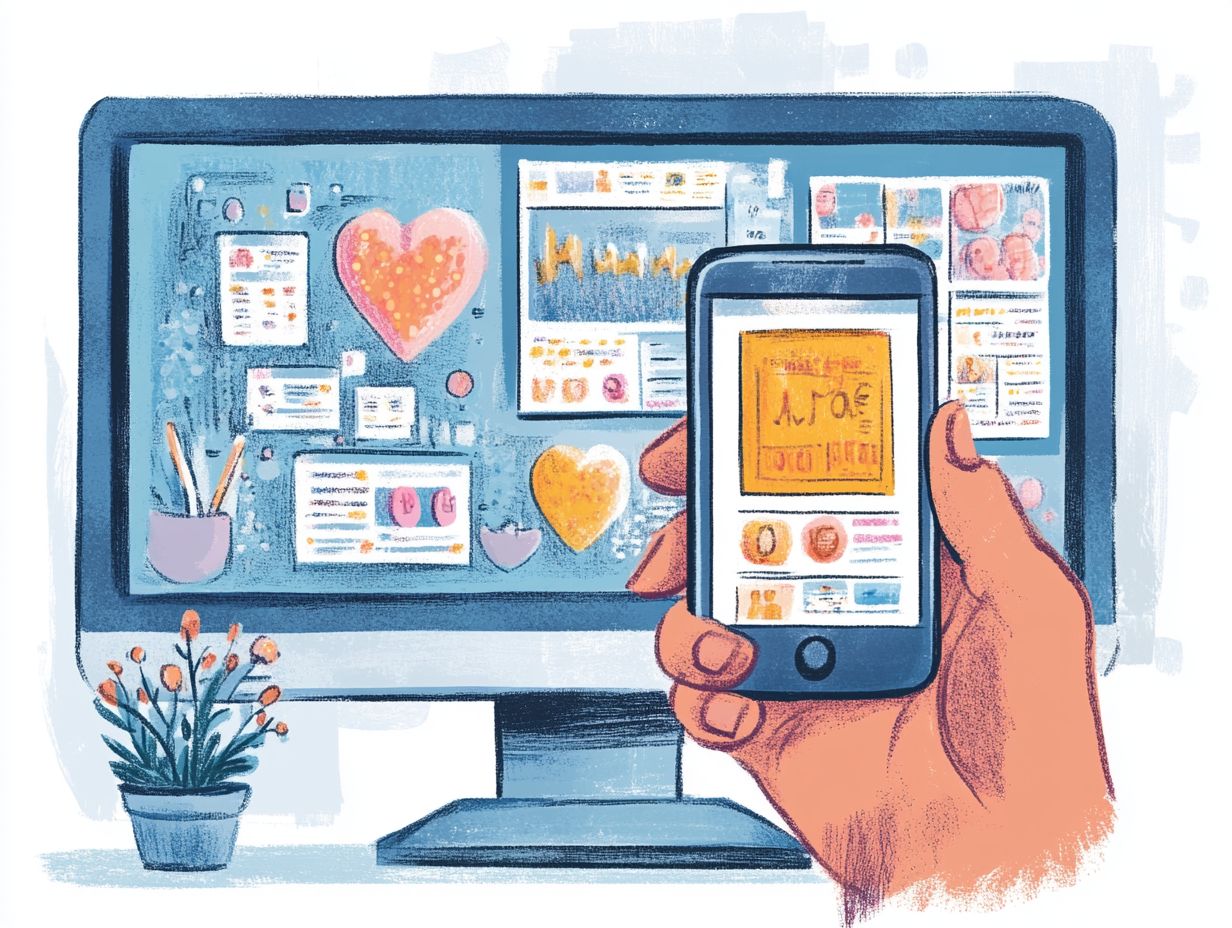Finding the right support during a cancer journey is crucial, and online cancer communities offer a valuable resource for patients, survivors, and caregivers. These virtual platforms provide emotional support, share experiences, and access essential resources like cancer information and treatment options, helping individuals navigate their health challenges, including diagnosis and recovery.
Here are five notable online communities for cancer care and emotional support:
- American Cancer Society’s Cancer Survivors Network: Connects survivors through shared experiences, workshops, and practical support programs, providing community and emotional support.
- Cancer Support Community: Offers 24/7 helplines, peer support groups, and informational workshops for patients and caregivers, addressing both mental health and cancer care needs.
- Inspire: Fosters a supportive environment where users share personal stories to inspire hope and resilience, promoting a support network for those affected by diseases such as Hodgkin Lymphoma and breast cancer.
- Stupid Cancer: Focuses on young adults with cancer, providing educational resources, community events, and advocacy, helping them connect and find support during their cancer journey.
- The Leukemia & Lymphoma Society Community: Supports blood cancer patients with education programs, research funding, and local support groups, enhancing their quality of life and providing guidance through the network of services.
These communities serve as a lifeline, offering a sense of belonging and practical assistance. By joining an online cancer community, individuals can connect with others who understand their struggles and share valuable information to aid their journey, including transportation and financial assistance provided by programs like ACS CARES and the National Cancer Information Center.
Key Takeaways:
1. American Cancer Society’s Cancer Survivors Network

The American Cancer Society’s Cancer Survivors Network connects survivors, offering emotional support, shared experiences, and resources for recovery, including workshops, educational programs, and advice on estate planning.
This network provides workshops, volunteer support, and outreach programs to aid wellness and recovery, ensuring safety and a supportive environment.
Programs like the Helpline and Road to Recovery offer practical assistance including transportation, financial resources, and living accommodations such as Hope Lodge and Extended Stay America.
Caregivers also receive guidance, helping them manage cancer care effectively and navigate complex situations such as Triple Negative Breast Cancer and Hodgkin Lymphoma.
2. Cancer Support Community
Cancer Support Community provides emotional support and practical resources for cancer patients and caregivers.
Programs include:
- 24/7 helplines with trained professionals
- Peer support groups
- Informational workshops on cancer care and coping strategies
These services offer connection and understanding for those affected by cancer.
3. Inspire
Inspire is a platform designed to support cancer patients and survivors by sharing stories of hope and resilience, promoting wellness and connection through diverse support networks, including those offered by Summit Health and CanCare.
Inspire works by allowing users to share personal experiences, fostering community, emotional support, and engagement, with initiatives like the San Antonio Breast Cancer Symposium and contributions from authors like Kristin Hannah.
The platform encourages empathy, understanding, and proactive engagement in healthcare journeys.
4. Stupid Cancer
Stupid Cancer is a non-profit organization that supports young adults affected by cancer through resources, community events, and advocacy.
Stupid Cancer provides educational initiatives on treatment and wellness to help young adults make informed decisions.
Stupid Cancer builds support networks to connect individuals facing similar cancer challenges.
5. The Leukemia & Lymphoma Society Community

The Leukemia & Lymphoma Society (LLS) community provides support and resources for blood cancer patients and caregivers, offering specialized guidance through Connect Education Workshops and My Cancer Circle.
LLS enhances quality of life through patient education programs, research funding, community support initiatives, and financial grants aimed at improving patient outcomes.
Patient education programs offer information about treatment options and coping strategies.
Research funding advances innovative therapies and potential cures, with initiatives supported by EverYou and Giving Docs, fostering hope and advancement in cancer care.
Community support initiatives include:
- Local support groups
- Patient assistance programs
What Are Online Cancer Communities and How Do They Work?
Online cancer communities are virtual platforms where individuals affected by cancer connect to share experiences and access resources.
These communities work through specialized forums and social media groups, allowing participants to discuss treatment options, coping strategies, personal stories, and planning with professional advice from platforms like CaringBridge and MyLifeLine.
Online cancer communities provide emotional support and a sense of belonging, crucial for mental well-being during the cancer journey.
What Are the Benefits of Joining an Online Cancer Community?
Joining an online cancer community provides emotional support, a sense of belonging, and access to resources and information.
Benefits include connecting with others who share similar experiences, sharing coping strategies, and learning about treatment options, while also receiving emotional and practical support.
Online cancer communities help reduce feelings of isolation and promote resilience in navigating the cancer journey by providing a comprehensive support network and facilitating a safe space for communication.
How Can Online Communities Help with Emotional Support?
Online communities provide emotional support by enabling members to share experiences and discuss feelings.
Members connect with others who understand their struggles, fostering empathy and a sense of belonging.
Moderators maintain a safe and supportive environment, ensuring respectful and open conversations.
This supportive space helps individuals express vulnerabilities and receive shared understanding.
What Are the Different Types of Online Cancer Communities?

Different types of online cancer communities include dedicated forums, social media groups, and specialized support networks.
-
Dedicated forums, such as Cancer Survivors Network, provide anonymous discussions for sharing experiences and coping strategies.
-
Social media groups on platforms like Facebook offer casual connections for emotional support and personal stories.
-
Specialized support networks, such as the American Cancer Society’s patient navigation service, provide professional advice and resource connections.
How Can Someone Find the Right Online Cancer Community for Them?
To find the right online cancer community, identify personal needs and preferences, explore available options, and assess the support and resources that align with your cancer journey.
- Look for communities focused on specific cancer types or treatments.
- Read reviews from current and past members.
- Evaluate member engagement.
Choose a community where you feel comfortable, valued, and supported.
What Precautions Should Be Taken When Joining an Online Cancer Community?
Joining an online cancer community requires precautions for privacy and safety.
Avoid sharing personal information to protect your privacy.
Be cautious of misinformation; verify advice with trusted sources.
Identify emotional triggers to maintain a supportive experience.
Frequently Asked Questions
What are the 5 Online Communities for Cancer Care?

The 5 Online Communities for Cancer Care are CancerCare, American Cancer Society, Cancer Support Community, MyLifeLine, and CancerCare Connect.
|||
The 5 Online Communities for Cancer Care are CancerCare, American Cancer Society, Cancer Support Community, MyLifeLine, and CancerCare Connect. These platforms offer comprehensive resources and support for cancer patients and caregivers alike.
The 5 Online Communities for Cancer Care are CancerCare, American Cancer Society, Cancer Support Community, MyLifeLine, and CancerCare Connect.
Are these online communities only for patients with cancer?
No, these online communities also offer support and resources for caregivers, family members, and friends of those affected by cancer.
Do I have to pay to join these online communities?
No, all 5 of these online communities offer their services and resources for free.
Can I remain anonymous on these online communities?
Yes, all 5 of these online communities allow users to choose a display name and keep their personal information private.
What types of support can I find on these online communities?
These online communities offer various forms of support such as online forums, support groups, educational resources, access to professional counselors, and safety measures to ensure a secure and supportive environment.
Are there age restrictions for joining these online communities?
No, these online communities are open to people of all ages who have been affected by cancer in some way.





